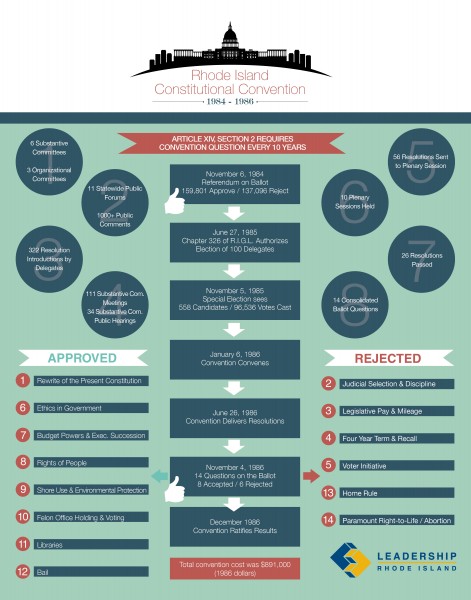
On the November ballot, referendum Question 3 will ask voters; “Shall there be a convention to amend or revise the constitution?” While most people following Ocean State politics are focused on who will be the next governor of our state, or the next mayor of our capital city, question three bears watching too. The process for putting the referendum on the ballot every ten years was the result of a 1973 constitutional convention ballot initiative.
The first time the voters were presented with the new question (in 1984) they authorized a convention. The result was a two-year process that placed 14 questions on the 1986 ballot, eight of which were ratified by the voters. In 1994 and 2004 the voters rejected the referendum and no conventions were held as a result. Our organization, Common Cause Rhode Island, opposed the last two referenda but in 2014 we are not taking a position. Quite frankly, there are too many compelling arguments for and against a convention this time. Just a cursory review shows both sides to have compelling arguments.
Supporters of a convention point to important constitutional changes that they assert are needed in our state as the impetus for their efforts. They also rightfully point out that many of these reforms that limit legislative power could be much more difficult to achieve through the typical process whereby the General Assembly puts proposed constitutional amendments it would like on the statewide ballot.
Opponents of a convention point to the many important changes that have been put on the ballot by the legislature; including Separation of Powers, downsizing the legislature, elimination of the much abused legislative pensions, merit selection of judges, etc. They argue that a convention will be a creature of the legislature given that the election of delegates is based on state legislative districts, and that in 1986 many of them had deep ties to members of the General Assembly.
Opponents of a convention express legitimate concerns about the possibility that such a gathering might put restrictions on important civil rights and liberties up to a popular referendum. They point to amendments from 1986 that would have put restrictions on abortion rights (which didn’t pass) and imposed restrictions on bail for certain drug offenses (which did pass).
Supporters point to the fact that the people must approve any changes to the Rhode Island constitution that are placed on the ballot by a convention, and that the voters overwhelmingly rejected new restrictions on abortions in 1986. They argue that the U.S. Constitution contains sufficient protections for civil rights and liberties, and that those cannot be abrogated by the a state constitution.
We encourage the voters of Rhode Island to look closely at the arguments made against a convention by Citizens for Responsible Government, and for having a convention by Renew RI. Both coalitions have already been spending considerable resources to make their respective point of view heard. No doubt the coming weeks will see even more arguments by both sides of this question.
Common Cause is engaging a different type of education, one that is not focused on persuading anyone about the merits or dangers of a convention. Rather we are trying to explore what a convention might look like by digging into the archives from the 1980s and other sources. Here are a few quick facts:
There were an extraordinary 558 candidates for the November 5, 1985 election of 100 delegates to the constitutional convention. That election resulted in only 96,538 eligible voters casting a ballot. The convention held 11 statewide public forums and received over 1000 comments. After that they held 111 substantive committee meetings and took testimony at 34 public committee hearings. The result was 322 resolutions introduced by the delegates and vetted through six substantive committees. Fifty-six of the resolutions were debated in 10 plenary sessions. The result was 26 resolutions that passed and were consolidated into the 14 ballot questions proposed in 1986.
There is much more to learn about the 1986 convention. The Common Cause website contains five hours of video from a March conference we hosted with Roger Williams University School of Law, the Hassenfeld Institute for Public Leadership at Bryant University, and the League of Women Voters or Rhode Island. Included are talks by Professors Alan Tarr and Robert Williams from the Center for State Constitutional Studies at Rutgers University, perhaps the two leading authorities on state constitutions. Other materials we have added include information about the campaign finance from the election of delegates.
While the candidates you vote for on November 4th may be in office for four or eight years, changes to our state’s constitution may last for generations. In the coming weeks we hope you take the time to become educated about Question 3 and make sure on Election Day to go down the ballot and make your voice heard on this issue, no matter where you stand.
]]> As regular readers of RI Future know Common Cause Rhode Island pushed for a People’s Pledge in the race for governor last year. Despite some skeptics the three leading Democrats agreed to the Pledge in April. Up until the final days the Pledge held and we saw not a single TV or radio ad run by an outside group in the primary. The one violation was quickly dealt with and represented only 1/10,000th of the total spending in the race.
As regular readers of RI Future know Common Cause Rhode Island pushed for a People’s Pledge in the race for governor last year. Despite some skeptics the three leading Democrats agreed to the Pledge in April. Up until the final days the Pledge held and we saw not a single TV or radio ad run by an outside group in the primary. The one violation was quickly dealt with and represented only 1/10,000th of the total spending in the race.
Today we wrote letters to the party nominees and asked them to negotiate another Pledge. While we didn’t literally offer our table again, we stand ready to facilitate a negotiation between the candidates. Last time we called for a Pledge we were armed with evidence from the Scott Brown-Elizabeth Warren U.S. Senate race. Common Cause research showed that the Pledge reduced the amount of negativity, the amount of undisclosed money, and increased the percentage of small dollar donors. Now we have evidence from Rhode Island that the Pledge keeps outside money out of the race. And there is a great survey by Lake Survey Partners showing bi-partisan support for the People’s Pledge.
Let’s hear from the candidates between now and November 4th and insist on a People’s Pledge!
]]>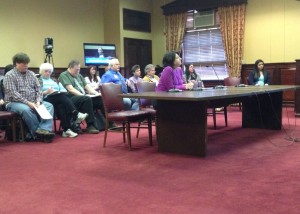 Last night the Senate Committee on Judiciary heard a full agenda of election bills. You’ll read a lot in the Projo and RI Future about the Voter ID repeal legislation Senator Gayle Goldin sponsored, and that deserves attention. But there were a number of other really important pieces of legislation that are largely being ignored in the shadow of the fight over Voter ID.
Last night the Senate Committee on Judiciary heard a full agenda of election bills. You’ll read a lot in the Projo and RI Future about the Voter ID repeal legislation Senator Gayle Goldin sponsored, and that deserves attention. But there were a number of other really important pieces of legislation that are largely being ignored in the shadow of the fight over Voter ID.
One of the untold stories about the Voter ID fight in Rhode Island is that it has distracted us from making actual improvements to our election system that could have a direct and measurable improvement for voters. Just this week the Pew Center came out with a 50 state ranking of election administration. While the average state improved 4.4 percent from 2008 to 2012 Rhode Island stagnated. So Rhode Island, which was once hailed by the Brennan Center as a leader in voter registration, is now losing ground.
Two of the other bills being heard last night would help us catch up:
S 2676 by Senator Gayle Goldin creates a system for online voter registration. In 2008 there were only two states that allow voters to register to vote, or alter their registration, using an online tool. As of last week, there are 22 states that have authorized such systems. In states where online voter registration has been adopted tens of thousands of citizens have taken advantage. Since we know that the more likely threat to election integrity are poor voter rolls, a system of online registration is the real way to reduce our dirty rolls and prevent registration fraud. Here’s the kicker; online voter registration not only makes it easier for people to register and change registration, but it saves cities and towns a ton of money.
S 2237 by Senator Erin Lynch creates a system of in-person early voting. Currently 32 states have some sort of in-person early voting. Rhode Island clings to a system from the 19th Century designed to accommodate an agricultural society where in-person voting only happens on Election Day. Senator Lynch’s bill would provide for evening and weekend hours accommodating citizens who lead 21st Century lives. In recent years Rhode Island has shortened Election Day by an hour and increased the number of voters per precinct. As the rest of the country makes advances, we retreat. In-person early voting has even been cited such as Hurricane Sandy.
While it’s right to be concerned about Rhode Island’s Voter ID law, let’s not forget there are a lot of areas where we need to make improvements.
]]>There are two ways actual citizens can unite in reaction. One is to amend the Constitution to ensure that money does not equal speech and corporations are not people. Another, much easier way, is to pressure candidates into signing a People’s Pledge. We’re on the cusp of that in the Democratic primary for Governor here in Rhode Island.
Back on October 23rd Mayor Angel Taveras signed a version of the People’s Pledge that would restrict outside spending by committing candidates to give to charity 50% of the value of any outside spending that occurs on their behalf. This morning Treasurer Gina Raimondo tweeted her support for the idea.
We’re 2/3rds the way there folks. Now two things need to happen for us to make it all the way. First, we need to have Clay Pell join in the commitment. Second, the candidates need to sit around the table and come to agreement. Today we’re offering this lovely conference table here at the Common Cause Rhode Island office for them to use.
Do your part by reaching out to the candidates and encouraging them to come to the table.
]]> In 1996 incumbent John Kerry and Governor William Weld were headed toward an epic showdown for the U.S. Senate in Massachusetts. Closely matched as candidates, they knew spending in their upcoming race could break records. In a novel twist the candidates themselves sat down and negotiated an agreement to limit the total amount that could be spent by the campaigns (including from their personal fortunes), their respective parties, and outside groups. They also agreed to a series of televised debates throughout the state. Although the spending caps broke down in the final days, the race was a watershed moment for campaign finance.
In 1996 incumbent John Kerry and Governor William Weld were headed toward an epic showdown for the U.S. Senate in Massachusetts. Closely matched as candidates, they knew spending in their upcoming race could break records. In a novel twist the candidates themselves sat down and negotiated an agreement to limit the total amount that could be spent by the campaigns (including from their personal fortunes), their respective parties, and outside groups. They also agreed to a series of televised debates throughout the state. Although the spending caps broke down in the final days, the race was a watershed moment for campaign finance.
Fast-forward to 2012 and incumbent Senator Scott Brown reached out to challenger Elizabeth Warren (read the actual correspondence) and challenged her to enter a People’s Pledge. Modeled after the Weld-Kerry agreement it included limits on outside spending (it’s notable that no one is talking about limiting total expenditures any more—Citizens United changed the political landscape and dialogue). After significant back and forth, both candidates signed on and even sent notice to third party groups and TV stations that might run their ads, warning them to stay out of the race.
Common Cause Massachusetts reported that the 2012 People’s Pledge did a great job at minimizing outside money in the Brown-Warren race when compared to similar races that year. We know that outside spending is overwhelmingly negative, can come from undisclosed sources, and can be raised in unlimited amounts. In 2013 when the Gomez-Markey race did not have a pledge outside spending from right and left came flooding back in.
So here we are in neighboring Rhode Island looking at the prospect of a very expensive Democratic primary, followed by a very short, but quite-possibly expensive, general election for governor in 2014. Typically races for governor aren’t fought on the national issues that draws outside groups into Senate races but that may be different this time.
Common Cause Rhode Island would like to see all candidates for governor negotiate a People’s Pledge. We mentioned the idea over a month ago when the first self-described Super PAC emerged. Sam Howard wrote about the idea at length on RI Future soon after. Quite frankly, we were waiting for the candidates to actually declare before we began to push for an agreement.
So now the cat is out of the bag. As a non-partisan group that does not engage in electioneering it would be easy to just let the topic die. We do not want to be seen as favoring any candidate over another. But this is too important a topic. Rhode Island deserves a campaign in 2014 that will focus on issues, not attacks. We deserve to know where the money that is backing the candidates is coming from. For those reasons we are asking the would-be candidates to meet and discuss this idea.
This won’t be easy. Massachusetts has demonstrated that these agreements might take some time to work out, but that they can work. Each candidate has strengths and weaknesses when it comes to campaign finance and the negotiations should address those. As the Supreme Court dismantles limits on money in politics (and next it might be limits on contributions directly to candidates) we need to look to alternatives. The People’s Pledge may be our best hope. Let’s give it a try.
]]>Voting is the interaction of four factors; the voter, the ballot, the machine used to tabulate the results, and the institutions governing the election. Typically studies about how voters behave have to rely on aggregate level data because of the secret ballot. As I will show later we now have micro-level information about voter behavior that will demonstrate problems with the straight-party option, particularly for some groups of voters.
In Rhode Island state law dictates that a paper ballot be used and the names of candidates be arranged by office [referred to in the literature as an office bloc ballot compared to the older party-column design]. Paper ballots are the only way to produce a truly verifiable trail for recounts (though Carlos Tobon can attest other changes in state law are needed to ensure that) and RI shouldn’t consider moving away from their use. There is no better system for verifying the results than the use of paper.
State law also requires use of an optical scanner to tabulate the results. While there are advantages to touch screen voting, particularly for accessibility, optical scanners with the requisite paper ballots are much better than black box touch screen systems. Optical scanners are by no means infallible, just read this scary report from the Brennan Center to see why we need to start auditing the results of our scanners.
The final pieces of the puzzle are our institutional structures. Typically in a Rhode Island election you have a number of different offices (federal, state, local) and ballot questions (state and local) that are a result of the many institutions that govern us. This too plays into why the straight party option is harmful.
Straight-party voting becomes a problem because of the interaction of those four factors. Optical scanners, for all their positive properties, cannot tell the voter that they have made an inadvertent error on the ballot. One of the few redeeming qualities of the old mechanical voting machines (sometimes referred to as the lever machines) was that when you pulled the actual “master lever” the only way you could bullet vote was to physically undo your vote for an office and then bullet vote (see pictures) and if you undervoted for it was literally staring you in the face.
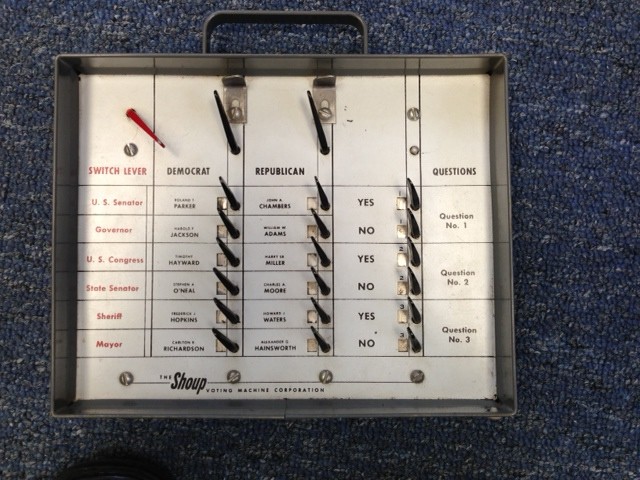
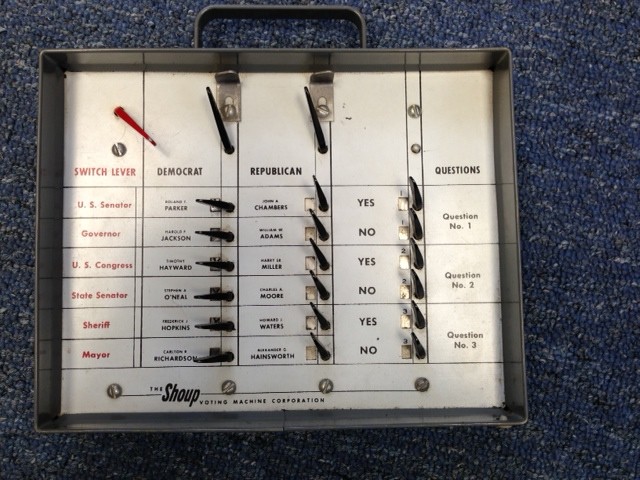
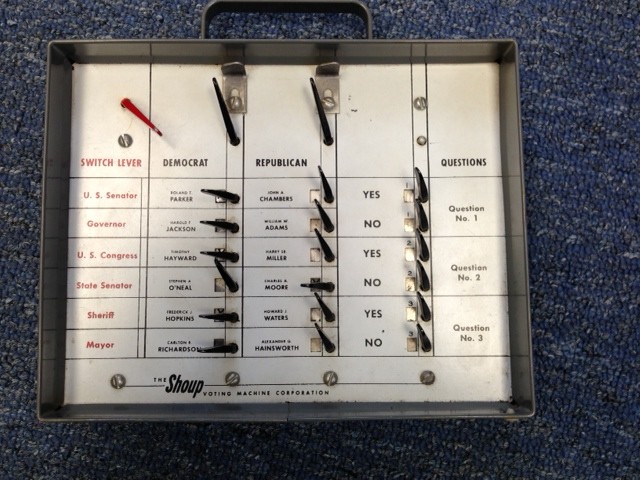
Compare the old machine to the current paper ballot (see pictures below). With the new ballots and scanners if you chose the straight party option nothing on the ballot will tell you what choices you made (or did not make) further down the ballot. And if you make a change, the ballot does not indicate what impact that might have on other parts of the ballot.
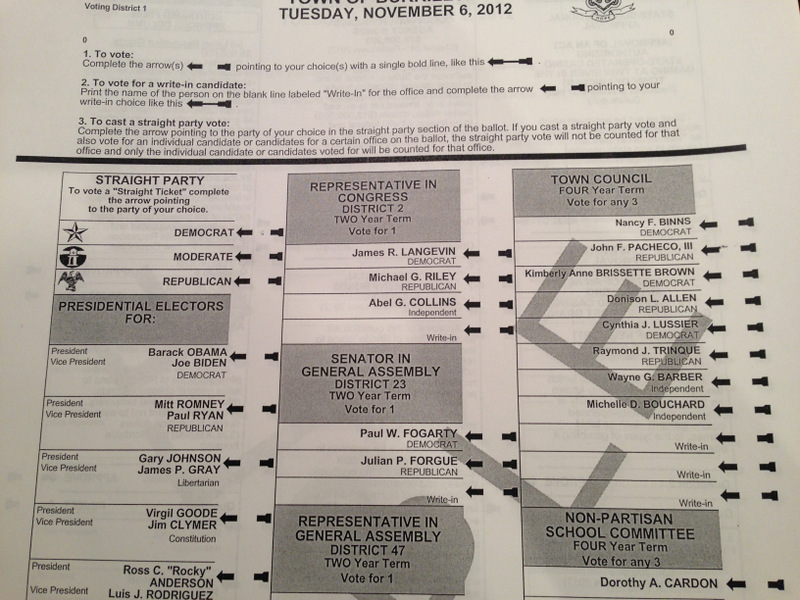
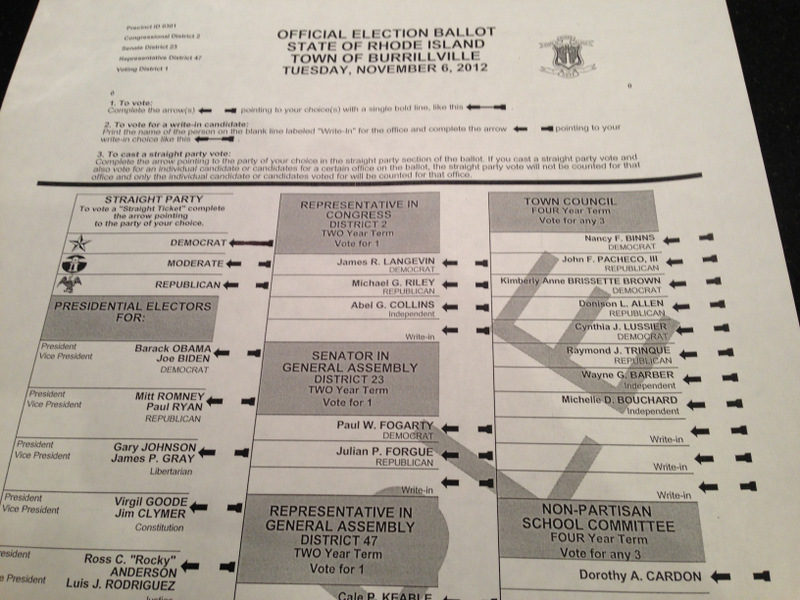
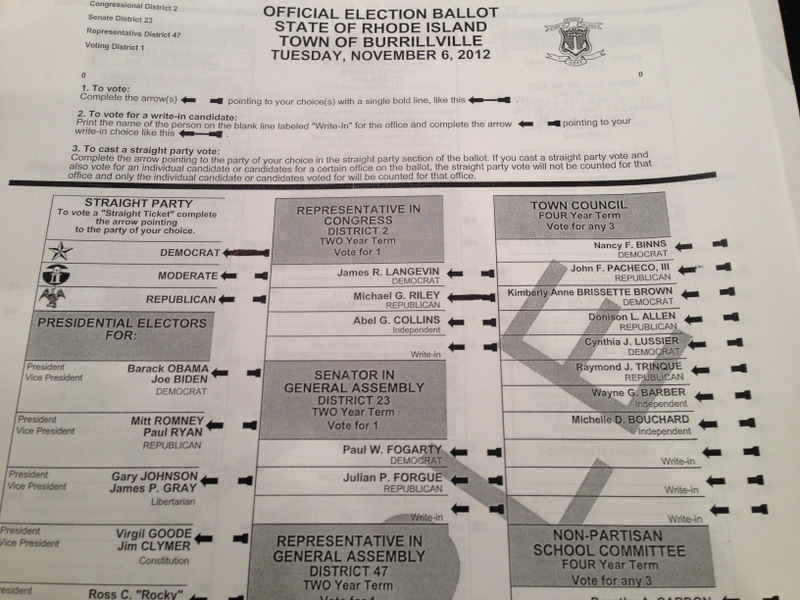
Of course because of the secret ballot we cannot know what the voter was really thinking when they used the straight party option and whether what we perceive to be undervotes and errors are intentional.
Fortunately, social science comes to the rescue. Several political scientists conducted an extensive experiment funded by the National Science Foundation (funding attacked recently in an amendment born out of the ignorance of Senator Tom Coburn) using the same type of ballot and brand of scanner (albeit a newer model) that we have here in Rhode Island.[1] Because their work was experimental, they could interview voters and examine their ballots to determine if the voters’ expressed preference were captured in the tabulation and thus avoid the ecological inference problem. And because they were using an experimental design they used a diverse set of participants and could test for how the interaction of ballot [similar in design to Rhode Island], machine [same brand, newer model than Rhode Island], institutions, and humans worked.
The best way to present the results is to quote directly from the authors:
Our research demonstrates that ballot design matters. It influences the number of errors of commission—that is selecting an unintended candidate—and omission—so-called undervoting. Voters who use standard office bloc ballots make fewer candidate-selection errors than those who use ballots with a straight-party option. These are the most serious type of error because not only do they deprive a candidate of a vote, they also give it to one of the candidate’s opponents. Wrong candidate errors also occur with substantial frequency—as the 2000 presidential election showed. Ballot style does not have a uniform effect on all voters. Older, less educated, and Black voters, are more likely to commit wrong candidate errors when using a ballot with a straight-party feature than a standard office bloc ballot. The same is true of voters who are using a specific voting system for the first time.[2]
Put into plain English, the researchers found that when using paper ballots with optical scanners and an office block ballot design, older, less-educated, African-Americans and those with less exposure to the optical scan voting machine all had more problems casting the correct vote when the straight-party option was available. It’s not that they undervoted (failed to cast a vote down ballot), but they actually voted for a candidate other than the one they intended to vote for. There were instances where the presence of the straight-party option led to undervotes, but that problem was minimized by the optical scan system, and dwarfed by the problem of actual errors being committed by the voters.
In Speaker Fox’s interview with Bob Plain he says, “you have to presume that they [voters] know what they are doing and that they are using the master lever.” We believe that the analysis we highlight here shows that, unfortunately, many voters do not. The mix of voters, ballot design, machine type and institutions we currently have just doesn’t work.
Hopefully providing this analysis allows us to move past the arguments about political motivation for removing the straight-party option. Quite simply, its presence does a disservice to a significant number of voters by preventing them from having their true preferences recorded as a cast vote. The bill to remove the straight party option has been “held for further study” once again this year. We have provided all the “study” that is needed to prove that it’s time for it to go.
[1] Paul S. Herrnson, Michael J. Hanmer, Richard G. Niemi, The Impact of Ballot Type and Voting Systems on Voting Errors, April 2008, accessed at http://www.bsos.umd.edu/gvpt/apworkshop/herrnson-hanmer08.pdf.
[2] Ibid, pp. 20-21.
